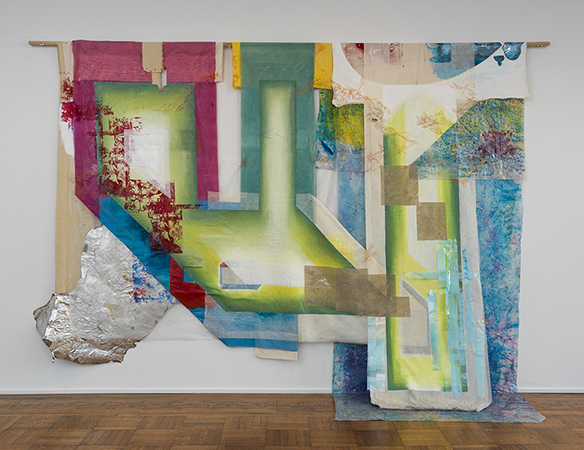Holding on When the Hand is Shoving You Back: Review of TOMASHI JACKSON Time Out of Mind
By Patricia Spears Jones
Often when confronted with complex economic and social justice issues, visual artists find themselves with this problem—how to make these concepts perceptible to viewers. There are the crisply declarative poster art style works that blares the artist’s sentiment. There are large scale installations that attempt immerse the viewer. Then there is the thoughtful layering of the large wall works that Tomashi Jackson makes for her exhibition, Time Out of Mind, currently on view at Jack Tilton Gallery until June 29.
Property development is the toxic layer that goes through all of New York City history, from the trading of land possessed by the Lenape to Dutch settlers to the endless construction of ever higher buildings where wealth is measured in square footage for people who may never enter their lucrative residence. How these “deals” are made, who makes them, who wins and who loses is the essential tale told in Jackson’s art work.
The African American property owners in what was called “Seneca Village” had few rights and fewer privilege, but they were homeowners. They like Black people before and after, made a way where there was no way. But they were in the way of an even larger concept—a park meant to provide respite to all its citizens for what was an increasingly unhealthy city. The land owners property was taken by eminent domain—some compensation was provided, but most claimed not enough and the hold outs were evicted in 1857. Jackson presents several works the explore that historic rupture and how it connects with current practices. In John Brown’s Body (Mr. Dorce in Red) and Heiresses (The Central Park Plan), she marshals skillful layering in her mixed media pieces—collage, digital printmaking, photography, muslin, vinyl, wood to narrate the ways in which government policies have been used to undermine Black achievement.
Press and Curl (Black and Brown People's Mortgage Free Homes), 2019
Silkscreen on mylar on canvas, on view at the Tilton Gallery
But it is her works focused on contemporary governmental land grabbing that truly stands out. Mary Lyons, Yudy Ventura, & the Co-op Women (Blues People) and Mary Lyons, Yudy Ventura & the Co-op Women (Red Line/Red Scare) powerfully conveys the steadfast resistance by people of color, esp. women of color to polices that are supposed to provide more “affordable housing”, but both take property from current owners and displace them with little or no compensation—a signature policy of the DeBlasio administration. Jackson knows these women—you can feel it in this work and others. Their figures are prominent, the colors bright then muted as if the conversation go from shouts to whispers. These acrylics, oil and image transfer on paper and muslin with digital prints on vinyl serve as metaphors for a homeplace where paper, fabric and hard plastics abide. Also, she encrusts these works with pearl pins and huge buttons—an expression of feminine elegance and eloquence. That one of the buttons says: “De Blasio Defends City Taking African American Properties” underscores the “same old, same old” city policies towards people of color.
Tomashi Jackson
Avocado Seed Soup (Davis, et. al. v County School Board of Prince Edward County)(Brown, et. al. v Board of Education of Topeka)(Sweatt v Painter), 2016
Mixed media on gauze, canvas, rawhide and wood
Tomashi Jackson’s work is complicated, yet readable. Her approach allows her to use layers of shapes, colors, techniques to narrate this tale —not even home ownership can protect any of us from racism. Jackson is in full command of all her techniques and she really uses her materials-wood, vinyl, paper with panache. Her emotional connection to this topic combines well with her research. As her gallerist noted this body of work:
is based on historical documents from archives on the creation of Central Park in the mid-1800s and draws upon the work by contemporary journalists Kelly Mena and Stephen Witt in the King’s County Politics New York newspaper and in Roy Rosenzweig and Elizabeth Blackmar’s The Park and the People: A History of Central Park.
Ms. Jackson’s work on this theme is also in The Whitney Biennial 2019 and her show at The Jack Tilton Gallery ends June 29.


